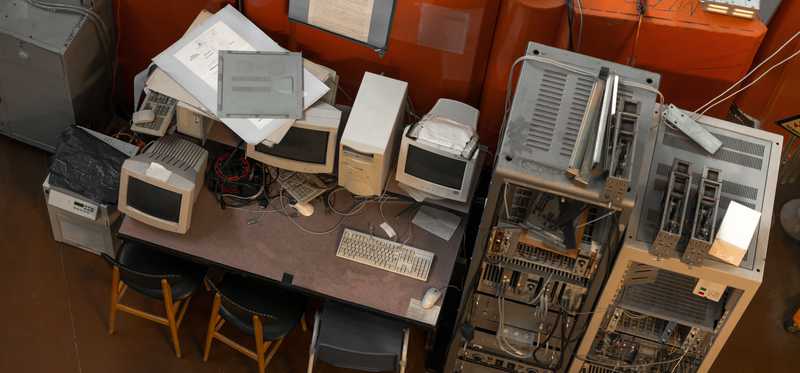10 Surprising Startup Ideas That Worked

10 Surprising Startup Ideas That Worked
Ideas for the ages
There are ideas that seem so outlandish when first introduced that few people take them seriously. Sometimes these ideas are just nuts, but others are simply so far ahead of their times that they turn out to be the start of revolutionary change. In short, there are some startup ideas that not only work, but they also change the world as we know it. That can be incremental or, with some companies, it introduces a global phenomenon that has the power to impact every living being on Earth.
Here are 10 startup ideas that not only worked, but also altered the course of human existence.
Previous
Next

1. Cars... An industry for the people
Walk out of your home and watch the cars carrying people from one place to another and it's pretty easy to see that the automobile was a huge startup idea that hit it big. But there was more at work than just the car, which at first were merely play things for the rich and technically inclined. Henry Ford, the founder of the iconic Ford Motor Company (NYSE: F), helped to take the car and make it affordable for everyday folks.
There were two big pieces involved. The first was to pay employees a good wage, on a level that would allow them to actually buy the products they produced. And the second was the creation of an assembly line that allowed autos to be made at a low enough cost that they were more easily affordable by the masses. We take these things for granted today, but at the time they literally changed the way the world thought. Although Ford the company didn't actually go public until 1956, well after Ford the man had passed, the benefits of his vision are still with us today in millions of businesses (and on roads) around the world.
Previous
Next

2. Improving on the auto theme
Sometimes an idea isn't exactly revolutionary, but incremental. And yet, even with what is a modest advance, the ripple effect can still be huge. That's where Tesla (Nasdaq: TSLA) sits today. The idea of an electric car wasn't new when Elon Musk decided he was going to build a car company. But the idea of starting an auto manufacturer from scratch with the sole purpose of building electric vehicles... well that was something that seemed pretty crazy since it would mean competing with the multinational giants that dominated the space.
And yet Tesla, for all its faults, has somehow managed to succeed. Musk started out by making cars for the rich and has since attempted to broaden the appeal by bringing down the price of his electric vehicles. But a funny thing happened along the way, the entrenched auto manufacturers that were slow to embrace electric vehicles suddenly realized there was a real market opportunity and they risked losing it. And now every major automaker has plans for an electric car. Musk didn't create the idea for the car or even the electric car, but his audacious plan to build an electric car company has proven to be one of the most influential changes in the auto industry in decades. Even if Tesla as a company doesn't last, the change it helped create will.
Previous
Next

3. Shifting the auto paradigm
Sticking with the auto theme, it's time to take a look at a crazy idea that hasn't fully played out yet -- Uber Technologies (NYSE: UBER). The company's main business is to allow everyday folks with a car to effectively become a taxi driver. The real magic, however, was getting customers to comfortably and confidently book a car through the internet. This simple step upended the taxi business by providing an easier, cheaper solution to an age old problem (cost effectively getting from point A to point B). And because Uber was an early leader in the space, it was able to build the scale needed to "win."
Uber has created a very real business by allowing customer and car owner to meet up online. But the changes that Uber's middleman model has started are far from over. As automakers and others work toward driverless cars, Uber stands to become a leading provider of transportation services in a world where car ownership is increasingly unnecessary. While there are major companies looking to fill that niche, including the automakers themselves, Uber has already cultivated the customer base to support the paradigm shift. All it needs is for self-driving autos to become mainstream... and then ditch its current human drivers. That, in the end, could be the bigger "win" here.
Previous
Next

4. Transportation in the sky is pushing new boundaries
Another mode of transportation that we take for granted today is air travel. When Wilbur and Orville Wright were preparing for their first successful flight in 1903, however, it was an idea that seemed totally insane. And it took a long time for the technology to advance to the point where air travel is as common as it is today. But companies like Delta Air Lines (NYSE: DAL), which traces its roots back to the 1920s and the early days of commercial aviation, have clearly helped to change the world by turning what were once days long trips into ones that last just hours.
But there's a bigger change coming here, and just like the auto industry it has to do with autonomous vehicles. Only this time it's airplanes that are driving themselves. Drones are already a big business in some spheres, notably the military, but the technology is increasingly inching out to everyday use, for things like package deliveries. The next big step, however, is likely to be drone aircraft that ferry people around. Interestingly enough, Uber is looking to stake out a position in this market with a helicopter service. Right now the hope is to create short haul taxi-like services, but the long-term could see companies like Delta ditching their pilots in favor of computers and remote monitoring.
Previous
Next

5. Computers are at the core today
One thing that should be pretty apparent by this point is that a lot of the early upstart ideas were engineering based. A lot of the more recent crazy, world-altering advances came from applying technology advances to those early engineering innovations to push them to a new level. And that has only been possible with the help of companies like Microsoft (Nasdaq: MSFT), Intel (Nasdaq: INTC), and Apple (Nasdaq: AAPL). That's not an exhaustive list by any means, but it covers some of the biggest and earliest names in the space.
What this trio, and many more besides, helped champion was the idea that a computer could reside in a person's home. That simple idea took what was once a hugely expensive industrial business (dominated by companies like IBM (NYSE: IBM)) and made it accessible to the masses. The innovation that came from this small, but at the time wild, idea has transformed everyday life in a way that few technologies have before. Automobiles and airplanes are just two examples, noting that Apple has successfully managed to take the phone and merge it with a computer that you carry in your pocket... And in the process create an expanding services business that couldn't have existed a decade ago.
Behind the scenes, meanwhile, cheap, accessible computer technology has led to massive leaps with mundane tools like computerized typewriters (word processors), bookkeeping tools (spreadsheets and databases), and much more (video games, for example). And the changes are nowhere near done yet. But from the humble beginnings in a garage, as the story goes, we are now entering a world where no industry seems safe from change.
ALSO READ: How Microsoft Hit $1 Trillion: Cloud Computing, Steady Growth
Previous
Next

6. The internet's humble beginning
You can't talk about computers and their impact on the world without also discussing the internet. This technology allows people to connect their individual computers, and other devices, to other computers around the world. This tech was originally a government thing that really took hold in the world when companies like America Online (AOL) (now a part of Verizon (NYSE: VZ) started to send out millions of computer disks to build its customer base.
These were the days of dial up networks that worked over copper phone lines at very slow speeds. It wasn't at all clear that there was a real business to be created, with walled off content the norm and very limited connectivity by today's standards. In fact, some of AOL's growth efforts were so successful that the company couldn't keep up with demand for internet access. As the customer base grew, so did the content available, and more and more people took the leap online. Eventually, names like AOL faded from view to be replaced by high speed access provided by telephone and cable companies, like Verizon. The hub that AOL initially provided was replaced by companies that took a broader view of the world wide web, like Yahoo! (also bought by Verizon) and Google, which later changed its name to Alphabet (Nasdaq: GOOG).
But without pioneers like AOL, the internet wouldn't have taken off as quickly as it did. Yes, the company's specific business model proved to be flawed, however mass connectivity to the internet was not. And the next round of advances here is only just beginning, as more and more inanimate devices (like ovens and thermostats) get connected to the web.
Previous
Next

7. The new way to shop
One of the best examples of computers and the internet forcing an industry to modernize is Amazon (Nasdaq: AMZN). In this case the target was, at least at first, brick-and-mortar retail stores. The company's founder, Jeff Bezos, originally started selling books. It was a fairly easy target, since books are generic items. The big selling point being that Amazon could get you just about any book you wanted fairly quickly and at a low price. The availability in bookstores, by comparison, was constrained by space limitations and the high operating costs of physical locations.
It didn't take long before traditional brick-and-mortar bookstores were going out of business, including once large chains like Borders. But the damage from online shopping has spread quickly, even taking on its own nickname: the retail apocalypse. That sounds scary, and is perhaps a bit of hyperbole, but the impact is very real. Effectively, retailers across the board are being forced to compete with online sellers. That generally means taking an omni-channel approach, which is a fancy way of saying brick-and-mortar stores need to have a presence on the web, too. And Amazon has been a huge driving force, as it increasingly spreads into new areas. Mail order wasn't new, but using the web to facilitate mail order on a massive scale was outside the box when Amazon was a start up. Now it's huge and the retail changes it helped bring about have taken down once proud names from Sears to Toys R us, and a whole lot in between.
Previous
Next

8. The sharing economy grows up
There's any number of companies that could be highlighted as using the internet to change an industry, with Amazon and Uber two really good examples. But there's another one that's making headlines today that deserves a mention, though as of this writing it isn't public yet, and that's Airbnb. Like Uber, Airbnb has its roots in the so-called sharing economy, where people use their personal property to generate income. In this case, homeowners use the Airbnb website to rent out space to others (through the internet) for short-term stays.
The idea of letting a stranger into your home to stay for a night or two is still uncomfortable for many people. As is the reverse, staying in a stranger's home. But the company now helps 2 million people a night find a place to rest their heads. There's no question that Airbnb has hit on something big. And as a first mover in the space, it has created a massive following of renters and property owners.
Although the current valuation of the company at over $30 billion, based on recent funding rounds, seems extreme, the changes Airbnb has created are very real. And interestingly, hotels are looking to mimic the Airbnb service while at the same time Airbnb is looking to get a toehold in the hotel space. What the final outcome here is highly uncertain at this point, but there's no question that the once crazy idea of renting a room to a stranger for a night or two is here to stay thanks in large part to Airbnb.
Previous
Next

9. How much did that trade cost again?
There's another place where technology helped change the world as we know it and that's, drum roll please... stock trading. Once brokers earned large commissions and there simply wasn't an alternative way to invest. But then computers allowed for better record keeping and faster processing, and companies like discount broker Charles Schwab (NYSE: SCHW) looked to pass the savings that technology provided on to customers. To a full-service broker, used to fat trading commissions, that was nothing short of heresy.
But Charles Schwab, the man, created a massive financial giant on this idea. And has continued to expand his company's reach into new areas, including providing financial intermediaries (like financial planners and asset managers) the tools they need to serve their clients via the Charles Schwab platform. This change has allowed small investors more access to the capital markets to build their wealth over time. Charles Schwab's results may go up and down with the markets and trading volume, but its business model was an unqualified success and, effectively, created an entire new niche within the finance industry.
Previous
Next

10. The new kid in the investment universe
Another place where technology was applied to an old investing idea to upend decades-old practices was asset management. While accepted today, when State Street (NYSE: STT) launched SPDR S&P 500 ETF (NYSEMKT: SPY) it was taking a big risk with a completely new product. That said, tracking an index wasn't new and neither were pooled investment products. But the exchange traded fund, with a complicated structure that allowed for all-day trading and low costs, was new to U.S. investors. The company had to jump through more than a few hoops to get the product approved.
However, there's little question at this point that State Street's odd little product has changed investing as we know it. With well over $3 trillion in assets in ETFs at the end of 2018, this one fund has spawned a diverse and growing industry. To be fair, most of that growth has come during a bull market, but it is highly likely that State Street's upstart idea is here to stay.
There are plenty more revolutionary, and perhaps crazy, ideas that could be highlighted, from McDonald's (NYSE: MCD) championing the franchise model to Beyond Meat's (Nasdaq: BYND) focus on meatless "meat" products. However, it should be clear from the 10 ideas listed here that humans have an uncanny habit of creating new things from scratch and then improving on them with new technologies. The winners can be hard to spot at times, but the changes that come from ideas that ultimately fail financially can be long lasting and wide reaching. And often you don't need to be the first one to see the potential to benefit from it.
John Mackey, CEO of Whole Foods Market, an Amazon subsidiary, is a member of The Motley Fool’s board of directors. Suzanne Frey, an executive at Alphabet, is a member of The Motley Fool’s board of directors. Teresa Kersten, an employee of LinkedIn, a Microsoft subsidiary, is a member of The Motley Fool’s board of directors. Reuben Gregg Brewer owns shares of IBM. The Motley Fool owns shares of and recommends Alphabet (C shares), Amazon, Apple, Delta Air Lines, Microsoft, and Tesla. The Motley Fool owns shares of Intel. The Motley Fool is short shares of IBM and has the following options: short September 2019 $50 calls on Intel, short January 2020 $200 puts on IBM, long January 2021 $85 calls on Microsoft, short January 2020 $155 calls on Apple, long January 2020 $150 calls on Apple, short September 2019 $145 calls on IBM, long January 2020 $200 calls on IBM, short January 2020 $155 calls on Apple, and long January 2020 $150 calls on Apple. The Motley Fool recommends Uber Technologies and Verizon Communications. The Motley Fool has a disclosure policy.
Previous
Next
Invest Smarter with The Motley Fool
Join Over Half a Million Premium Members Receiving…
- New Stock Picks Each Month
- Detailed Analysis of Companies
- Model Portfolios
- Live Streaming During Market Hours
- And Much More
READ MORE
HOW THE MOTLEY FOOL CAN HELP YOU
-
Premium Investing Guidance
Market beating stocks from our award-winning service
-
The Daily Upside Newsletter
Investment news and high-quality insights delivered straight to your inbox
-
Get Started Investing
You can do it. Successful investing in just a few steps
-
Win at Retirement
Secrets and strategies for the post-work life you want.
-
Find a Broker
Find the right brokerage account for you.
-
Listen to our Podcasts
Hear our experts take on stocks, the market, and how to invest.
Premium Investing Services
Invest better with The Motley Fool. Get stock recommendations, portfolio guidance, and more from The Motley Fool's premium services.